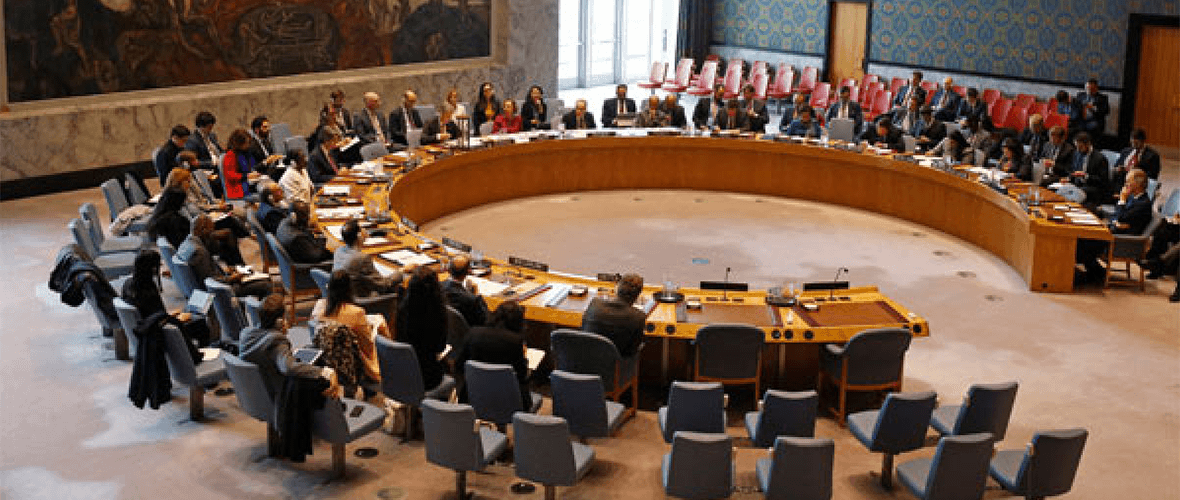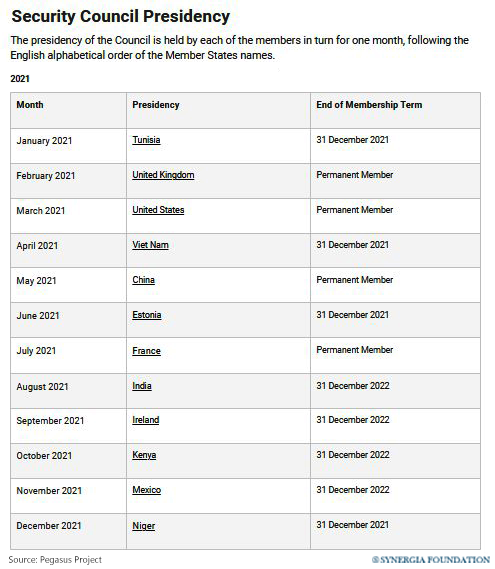India’s Presidency at the UNSC
August 9, 2021 | Expert Insights

As part of the Rotational Presidency system of the United Nations Security Council, India has taken over as President of the Council for August 2021. What implications does this have for its key foreign policy objectives?
BACKGROUND
India was elected to the UNSC in January 2021 for a two-year term as one of the 10 rotating non-permanent members. As part of its new role as president of the UNSC that all 15 members get in the rotation, India will decide the agenda of the UN’s highest decision-making body whose resolutions and directives are binding on all member states. India will also coordinate important meetings on a range of issues during August.
Each non-permanent member gets the opportunity to operate as president of the UN Security Council during the two years it is part of the grouping. The presidency of the UNSC changes hands every month between its members in the English alphabetical order of the member states' names.
India has been the president of the body in June 1950, September 1967, December 1972, October 1977, February 1985, October 1991, December 1992, August 2011, November 2012. The president decides the agenda for the month, coordinates important meetings and other related issues, and is in an influential position.

ANALYSIS
India has been campaigning for a permanent seat at the UNSC along with Germany, Japan and Brazil for many years. In recent years, New Delhi has made the theme of “reformed multilateralism" central to its diplomacy—calling the UN structure that came into existence in the immediate aftermath of World War 2 “anachronistic" and in need of urgent change.
While the US, France, Britain and Russia are not averse to India joining the UNSC as a permanent member, China has been opposed to it.
India will focus on three major areas—maritime security, peacekeeping and counter-terrorism, as it assumed the presidency of the United Nations Security Council for the month of August. Apart from meeting on critical security issues, India will also be organizing an event in memory of peacekeepers.
As part of its presidency, the Indian Prime Minister Narendra Modi will address a meeting of the UNSC as Chair of the council. This is the first time an Indian Prime Minister will address the council as Chair and it is a significant gesture that reflects the importance New Delhi places on its role as the President of the Security Council.
Meanwhile, External Affairs Minister Dr S Jaishankar is in New York and will be chairing two important debates, one on technology and peacekeeping and another will be a discussion on Secretary General’s 13th strategic-level report on ISIS.
U.S. Secretary of State Antony Blinken was in India on his first trip as secretary of state. During the two-day visit, Blinken had meetings with Indian External Affairs Minister Dr. S. Jaishankar, National Security Advisor Ajit Doval, and Prime Minister Narendra Modi. Despite concerns on the Indian side, at least among the strategic community, about possible irritants in the India-U.S. bilateral relationship on issues such as human rights, curtailment of religious and media freedoms, and the overall tone of Indian democracy, the visit was amicable.
Prior to the visit, there were apprehensions on the Indian side because of the U.S. focus on democracy, and the apparent weakening of India’s liberal values. The U.S. has placed democracy and ideology as an important asset in the conflict with China.
ASSESSMENT
- India’s presidency at the UNSC is going to be a test of its strategic alignment with countries sharing common concerns such as terrorism, radicalism and maritime security. The border conflict with China last year has appeared to hasten India’s acceptance of “the Quad” as a reliable counter to Beijing’s growing importance in Asia.
- It remains to be seen if New Delhi will use its presidency to push for a comprehensive debate on Afghanistan, more so after the US’s messy exit from the country. The Taliban represents a significant threat to India’s ongoing commercial projects in the country, in addition to national security concerns with reference to cross-border terrorism and illicit drug trade.
- India was not in the council when the Kashmir issue was raised behind closed doors in the UN Security Council. With India now part of the discussion, it is likely that Pakistan will try similar moves through its ally China, a P5 member state.








Comments